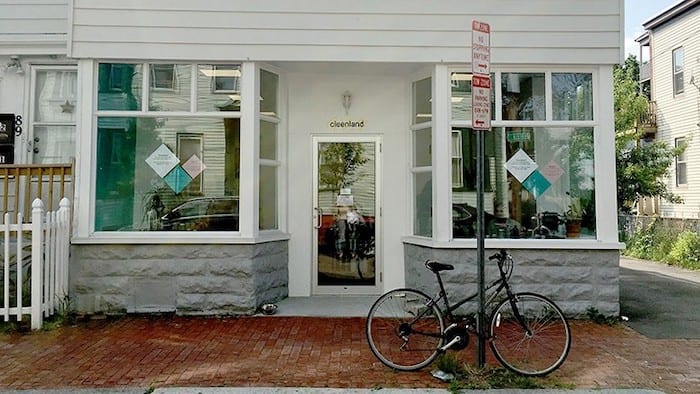
Package-free shopping comes to Boston
Sixty-five Fenway Parks’ worth. That’s how much garbage the state of Massachusetts disposes of each year. And Cleenland, a store that opened this June in Central Square, is betting on your willingness to prevent at least a few ballparks’ worth of waste—not just from going to landfill, but from existing altogether.
Entering Cleenland’s cheerfully decorated brick and mortar on Norfolk Street, nestled unassumingly among a slew of Cambridge residences, one is struck by its simplicity. The perimeters of the room are sparingly lined with an assortment of useful items, but in the center of the store—and central to Cleenland’s premise—lies a table of large vats. Inside them are cleaning fluids, everything from shampoo to dishwashing liquid. Customers pump a desired amount into their own containers, weigh them, and pay a per-ounce price. It’s the low-waste or bulk option version of purchasing cleaning supplies, which operates on a BYOB service. It’s a kind of back-to-the-future approach, as refillable, bulk options for food and other goods were the way to go before cheap plastic packaging transformed consumption about 50 years ago. But these days, in a world where packaging waste makes up nearly 30% of what we throw away, Cleenland’s simple strategy feels somehow disruptive.
Shopping package-free doesn’t always mean bringing your own containers; sometimes it can just mean getting over your irrational germophobia and buying that bar of soap in its birthday suit. But for the most part, this is a business model, the first of its kind in the Boston area, that asks customers to think a few steps in advance.
If that sounds like more work for the consumer, that’s because it is. It’s a move that seems to contradict another prevalent trend in retail: the shift toward instant delivery groceries and goods. Never before in history have we had the option to put less effort into our shopping, and yet, Cleenland appears to be asking us to put more. This paradox is not lost on Cleenland’s owner, Sarah Levy, a native of upstate New York who has settled in Cambridge for the last decade.
“There’s a difference between what people say they care about and what they’re actually willing to do in their day-to-day lives, and that’s the big gamble with Cleenland. The biggest thing we’re up against is convenience culture,” explains Levy. In other words, bringing a reusable shopping bag is by now fairly commonplace in Massachusetts (whose Senate is currently mulling over a statewide plastic bag ban)—but are folks ready to bring reusable everything else, too?
It wouldn’t be a bad time to start. For the last few years, consensus and urgency in Massachusetts have been growing about seriously cutting down on waste sent to landfill. For one, there is virtually no space left in the state to house the growing piles of garbage. And from a greenhouse gas perspective, landfills are a disaster. They release methane in droves, a gas that is 84 times as potent as carbon in its first two decades.
In this vein, the MassDEP released a Solid Waste Master Plan for 2010 to 2020. Heralded as a “Pathway to Zero Waste,” it had ambitious hopes of decreasing the amount of trash the Commonwealth disposes of by 80% by 2050. Municipalities have followed suit: This June the city of Boston released a “zero waste” plan. The city of Cambridge, where Cleenland is located, is also working on its own zero waste master plan. But while many municipal and state programs focus on diverting waste—through recycling and composting—only a handful of measures target the waste upstream, curbing or setting limits on the unsustainable production practices that got us here in the first place. Turns out, reducing our trash is a much more complicated objective, riddled with economic uncertainty and political maneuvering.
Perhaps the biggest challenge for the state so far, says John Fischer, who manages solid waste programs at MassDEP, is balancing economic goals with environmental ones; unfortunately, in our current climate, the two rarely align. “There’s a pretty consistent trend where when the economy rises, waste disposal rises.” Fischer explained in a recent interview. “There’s just more economic activity, there’s more materials being bought and used and sold.”
This is partially why MassDEP has struggled in reaching some of its more imminent zero waste goals. They had hoped to divert 30% of trash from landfills by next year, but between 2008 and 2017, Massachusetts’ economy rose 16%. “From most perspectives, [the rise in GDP] is a good thing,” says Fischer, “But from the world of waste generation, that level of increase in waste, that’s a challenge.” Today, they aren’t even halfway towards their 2020 goal.
Recent upheavals in the recycling industry have also added to the difficulty. In 2018, China implemented a new policy severely limiting trash from foreign nations. With nowhere to send a third (16 million tons) of its recyclable trash annually, the price of US recycling skyrocketed and for a time, recycling really was garbage. “Not that the city can support a business, but it’s definitely in their best interest to have folks to pursue this sort of a lifestyle,” Levy recognizes of the situation.
Stores like Cleenland directly work towards the state’s goal of reducing the amount of waste residents produce, as some statistics point to packaging waste making up nearly a third of what ends up in landfill. As consumers grow increasingly aware of the absurdity behind much of what fills their trash bins, more businesses are rising to the occasion and offering the option to purchase goods package-free. The independent grocery store Pemberton Farms on Mass Ave, for example, has developed an extensive bulk section—perhaps the most extensive in the Boston area since the closure of Harvest Co-op in 2018—which includes 120 bins of food products, 60 bulk spices and tea, cleaning solutions, oil and vinegar, and even pet food. Even conventional stores in the region, like Star Market, are introducing bulk sections in certain locations to meet an increasing customer demand.
Emily Kanter, whose health store Cambridge Naturals in Porter Square opened during the health food craze of the ’70s, has offered bulk herbs and spices from the start. It remains one of the biggest appeals of her business to customers. People are always amazed, she says, when their tab rings up $3.40 for 15 different spices—an additional perk of buying in bulk. Kanter is encouraged by consumers’ rising interest in sustainability, but she worries that it shouldn’t stop there. “It’s not to say that it’s not better that we’re getting one big delivery of lavender and then you’re collecting it in your mason jar. That does have an impact,” critiques Kanter of the movement, “But we can’t become complacent because we’re taking personal steps.” Wider, more systemic change is necessary. Stressing the role of state and local governments, she references the plastic bag ban enforced by the city of Cambridge in 2016, “Do you think most supermarket chains ever would have implemented their own bag ban had [the city] not created the rule?”
The price point for cleaning and personal care supplies is generally higher than for food. (Cleenland, for example, emphasizes products with high quality, natural ingredients from smaller companies whenever possible.) But Levy assures us that while her store may not always be competitive with conventional retailers, like Target, her products will be at least on par—and sometimes even lower—than other health retail stores, like Whole Foods. Cleenland’s liquid hand soap, for example, from the Newton-based, all natural company Global Balance, will sell at Cleenland for $.23 per ounce.
For her part, Levy isn’t expecting every aspect of society to go entirely garbage abstinent overnight. “I’m not a zero waste crusader”—she prefers to use the term “low waste” to describe her efforts—“I’m doing my best as a regular person who cares about this and I think that is what we should all be doing. Not beating ourselves up about stuff, but trying to get better. And it’s not easy.”
CLEENLAND. 89A NORFOLK ST., CAMBRIDGE. 857-228-4595. CLEENLAND.COM
Karine Vann is a freelance journalist based in Cambridge writing about the intersection of consumerism and the environment. Her work has appeared in Smithsonian.com, The Counter, Civil Eats and more. She's the former editor of The Armenian Weekly newspaper in Watertown.

